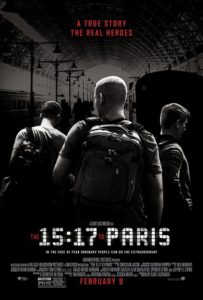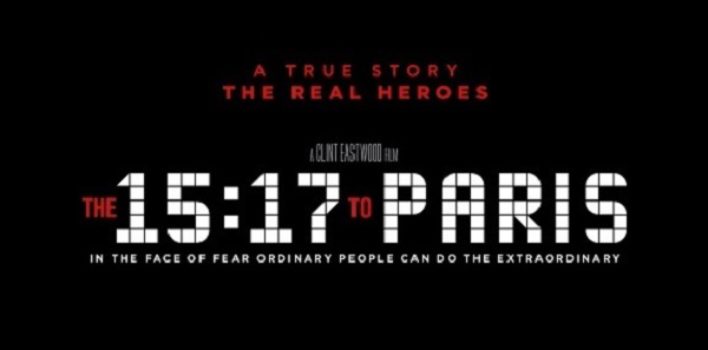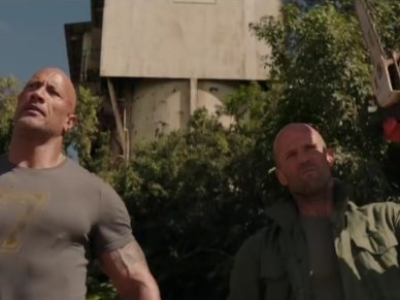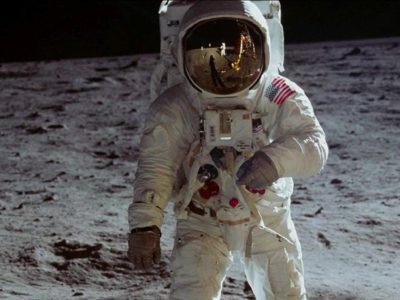Review| The 15:17 to Paris
 On August 21, 2015, an Islamic terrorist attempted to cause mass death and destruction on a Thalys train bound for Paris. Three 20-something American men (two of whom were military) confronted the attacker and prevented the deaths of potentially hundreds of passengers.
On August 21, 2015, an Islamic terrorist attempted to cause mass death and destruction on a Thalys train bound for Paris. Three 20-something American men (two of whom were military) confronted the attacker and prevented the deaths of potentially hundreds of passengers.
The 15:17 to Paris tells the story of that incident in gripping, edge-of-your-seat fashion. Director Clint Eastwood has a knack for creating exceptional portraits of real-life events (American Sniper, Flags of our Fathers, and Letters From Iwo Jima, to name a few). However, the execution of the story beyond the train leaves a lot to be desired.
Though its technique and pacing are clunky at times, The 15:17 to Paris‘ thematic heart is very strong. Within this story of tragedy averted is the acknowledgment of something every human being knows to be true deep within themselves: that every life has a plan and purpose.
The Good: Experimental Eastwood
The actual train attack sequence is masterfully done and my favorite part of the film. This is Eastwood at his best: telling a harrowing and human true-life story with unflinching grit. He fills every frame with great intensity – giving the audience a taste of what it was like to be in the middle of that struggle. The suspense doesn’t let up from the moment the deranged assailant emerges from the bathroom ready for mayhem until the three heroes subdue him. The confined space of the train adds to the tension, with the shots getting tighter and tighter as the fight goes on. Just a brilliant sequence.
 It was interesting that Eastwood opted to use the actual heroes from the attack – Spencer Stone, Alek Skarlatos, and Anthony Sadler – to play themselves rather than trained actors. Hollywood has done similar projects in the past with sports figures like Babe Ruth as well as war heroes like Audie Murphy (the latter had a decades-long acting career). It was a bold choice and quite the experiment in this day. It pays off for the most part. The three men played their parts very naturally, albeit a bit stiff sometimes.
It was interesting that Eastwood opted to use the actual heroes from the attack – Spencer Stone, Alek Skarlatos, and Anthony Sadler – to play themselves rather than trained actors. Hollywood has done similar projects in the past with sports figures like Babe Ruth as well as war heroes like Audie Murphy (the latter had a decades-long acting career). It was a bold choice and quite the experiment in this day. It pays off for the most part. The three men played their parts very naturally, albeit a bit stiff sometimes.
The Bad: A Long Way to Get There
This film’s weakest aspects are in its screenplay by Dorothy Blyskal. Some of the scenes went on longer than they should have. While there definitely needed to be some set-up in order to hammer home the film’s theme, it took an inordinate amount of time to get there, with lots of lulls, tangents, and clunky dialogue.
The scenes of the men’s travels through Europe were the worst offender. For the most part, it has little to do with the actual plot, other than seeing what the men were doing in the days leading up to the attack. At least ten minutes of the travelogue could have been cut and the film would have been better for it. Eastwood is usually so concise when it comes to his montages that it was surprising just how overindulgent the whole sequence was. After we came out of the movie, my wife said that sequence was like watching someone else’s vacation home movies, and I definitely agreed.
 In addition to scene length, some of the dialogue was a little too on-the-nose for my taste. These lines mostly came from the on-screen mothers of Skarlatos and Stone (played by Jenna Fischer and Judy Greer, respectively). Particularly eye-rolling was Stone’s mom’s proclamation about God being bigger than the school system. It’s true that He is, but the line was just so hackneyed and seemed like cheeseball, Kendrick Brothers-level bad writing.
In addition to scene length, some of the dialogue was a little too on-the-nose for my taste. These lines mostly came from the on-screen mothers of Skarlatos and Stone (played by Jenna Fischer and Judy Greer, respectively). Particularly eye-rolling was Stone’s mom’s proclamation about God being bigger than the school system. It’s true that He is, but the line was just so hackneyed and seemed like cheeseball, Kendrick Brothers-level bad writing.
My last quibble was with the montage of Spencer Stone getting into shape for his Air Force exam. We hear the voice of what sounds like a preacher throughout the sequence talking about struggle and choosing to endure pain to achieve a goal. This was a great set of lines, but there was no context. It would have been nice to actually see the preacher interspersed within the montage so the audience could establish a connection about where these ideas were coming from (the church).
God Has a Plan for You
“I don’t know, man, do you ever just feel like life is just pushing us towards something, like some greater purpose?” Spencer Stone
There are seasons we experience and lessons we learn in life that lead us to where we are, which is the central idea within The 15:17 to Paris. It is true that we are the sum of the choices we make, but there is also a larger plan coming to fruition – a perfect plan orchestrated by our Creator to achieve His perfect and righteous ends.
 When the audience first meets Spencer Stone in The 15:17 to Paris, he’s a trouble-making little boy looking for direction (punctuated by the absence of a father). He prayed earnestly, asking God for direction and purpose. As he matured, his wandering turned into laziness. Finally working towards a goal of getting into the Air Force, he’s frustrated by his personal failures within the system. All of his expectations are constantly turned upside down, including not getting into the unit he wanted.
When the audience first meets Spencer Stone in The 15:17 to Paris, he’s a trouble-making little boy looking for direction (punctuated by the absence of a father). He prayed earnestly, asking God for direction and purpose. As he matured, his wandering turned into laziness. Finally working towards a goal of getting into the Air Force, he’s frustrated by his personal failures within the system. All of his expectations are constantly turned upside down, including not getting into the unit he wanted.
“‘For I know the plans I have for you,’ declares the Lord, ‘plans to prosper you and not to harm you, plans to give you hope and a future.'” Jeremiah 29:11
God often reveals the things He has planned for us only when we are ready for them. Spencer Stone’s life experiences, though they were filled with failure and frustration, were leading him to that moment of action on the train. God was using him just as Spencer had asked: as an instrument of righteousness. Spencer couldn’t see it at the time, but all the things he was going through (getting into shape, military medic training, etc.) were leading him to that moment on the train. And God was definitely with him in that moment – as the attacker’s gun jammed right when Stone decided to act.
Many have responded to God’s call in their lives with “I’m not good enough.” But God has used all kinds of people to achieve His goals. Tax collectors, adulterers, murderers, thieves and the like have all come under the sway of God. Stone was an aimless, frustrated wanderer who asked God to use him as His instrument. He and his two friends were not perfect, godly men. In the movie, we see them drink to excess, swear, and ogle women. No man, not even a Christian man, is perfect. Yet God still used these imperfect men to thwart an act of evil.
So What I’m Trying to Say is
The 15:17 to Paris is an interesting and flawed movie. It’s both a bold experiment and a conventional, patriotic blockbuster. Clint Eastwood’s gamble with the actual heroes playing themselves on screen does pay off. However, the film’s narrative gets bogged down in unnecessary tangents and on-the-nose screenwriting. But overall, I found it enjoyable enough.
 The film does fumble, but its thematic heart is definitely in the right place. It shows how God prepares us for our role in His larger plan, even if we aren’t able to see it in the moment. The Lord works constantly in our lives, shaping us into the people He wants us to be – but only if we are willing to be shaped.
The film does fumble, but its thematic heart is definitely in the right place. It shows how God prepares us for our role in His larger plan, even if we aren’t able to see it in the moment. The Lord works constantly in our lives, shaping us into the people He wants us to be – but only if we are willing to be shaped.







